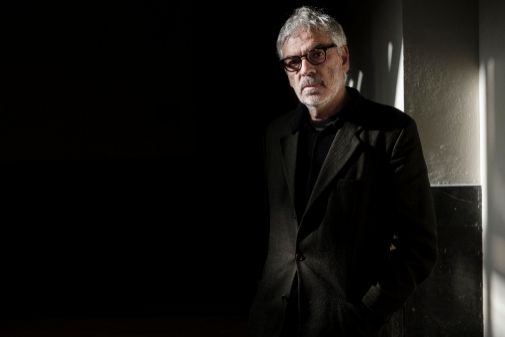Paraphrase in Spanish Pedro Costa (Lisbon, 1958) a verse by Georg Trakl. He does it to try to describe what the illuminated blackness that presides over his last and prodigious work means to him. "It is necessary to darken the dark to see better , " he says, pauses and corrects point by point the verse of the Austrian poet of the twentieth century around. "It is not so dark what I pursue, it is more dense. I prefer to talk about density rather than darkness. Yes, it is a dense film ; any human being for me is dense," he says. Well, the dense gravity, which not only darkness, of 'Vitalina Varela' has been designated as the best film of the Gijón Festival recently closed after receiving a similar award in the last edition of Locarno. And indeed, it could not be otherwise.
The film rescues from the shadows one of the characters that accompanied the protagonist of his previous work, Horse money (2014). There, in that circular, intense and dreary movie, Ventura, the same one of Juventud en Marda (2006), wandered through the corridors and little roads of a hospital and its own memories. And there, collapsed by the weight of his misfortune, the Vitaliana Varela woman, who gives title to her last film, emerged from a hard and perfectly real dream.
Now, the story is told of a woman who travels from Cape Verde to Lisbon in search of her husband who emigrated long ago. When you arrive at Portugal airport, there is nothing left. Her husband has died, the funeral has been fulfilled and mourning is a thing of the past, again, dark. And dense. He descends from the sick plane, with swollen feet and a few drops of urine (or tears or rain or even baptismal water) spilling onto his skin.
"The people of Cape Verde is an invention of the shadows," is heard on the tape and Costa responds: "It may be the human race itself, all of us, who come from them. But especially the Cape Verdeans, a people who are a mixture of slaves and all the colonizers (Portuguese, Spanish, Holnades ...) who passed through there. " Immediately afterwards, Vitalina Varela steps on the Lisbon suburb of Fontainhas where the director's filmography grows to reach the myth category. His particular Yoknapatawpha . It is the fifth time that a film by Costa has stood in that place of reality and fabulation at the same time in which emigration meets forgetfulness. And so on until it becomes an area or, better, a unique and almost sacred cinematographic zone where space is confused with time.
The film, as if it were a wounded canvas of deep caravaggio shades, pursues Vitaliana's pain. It is a hollow pain and hopeless. The story is told of a woman who was promised the possibility of a future and a journey that never came. And when they did, it was in the form of an absence. Not even the consolation of mourning, of farewell. All the tape navigates sleepwalking for a sensation near the orphanhood. So intense and profound that a state of the soul or simply an indissoluble condition of one's existence would be said. A cinematic miracle with the certainty of light. Yes, because in the end, between so much density, the light itself is glimpsed.
"The whole movie," the director reasons, "is Vitalina's own mourning. She failed to attend the more or less official ceremonies that preside over the death of a loved one: the wake, the funeral ... The team of the film and I felt we were providing Vitalina that opportunity;. as if the tape was his own ceremonial mourning and indeed, she slowly began to heal, to wear colored clothes cinema too, in. its gravity, it has to be that and it has to know which side it is on. " And, indeed, it is and it is.
Pedro Costa says that the first time he arrived at the Fontainhas neighborhood he did it full of gifts. He has just shot Casa de Lava (1994) in Cape Verde and took with him back to Lisbon all the presents of the emigrated families. "There was tobacco, coffee and many letters," he recalls. He was impressed by the gesture of men and women reading these letters. And there, one of the almost sacred images of his cinema, stopped. "That was the metaphor I liked: very close to people, very domestic and not at all aware of the script," he explains.
It could well be said that Vitalina Varela , the film and the woman, with or without quotes, both live at exactly that moment of reading a message transmitted from a distance by a loved one. Where the private and the public reside; The secret and the shared. It is space, but it is also time. It is cinema in its most radical evidence .
According to the criteria of The Trust Project
Know more- culture
- movie theater
CineLorene Scafaria: "Capitalism criminalizes women"
The hit of 'Terminator: dark destiny' at the box office complicates the future of the franchise
CinemaThe share of Catalan cinema falls to its historical minimum

